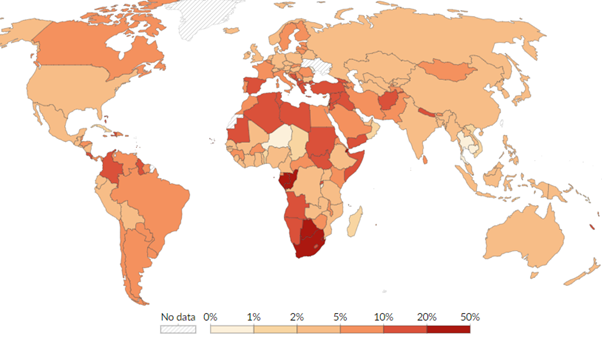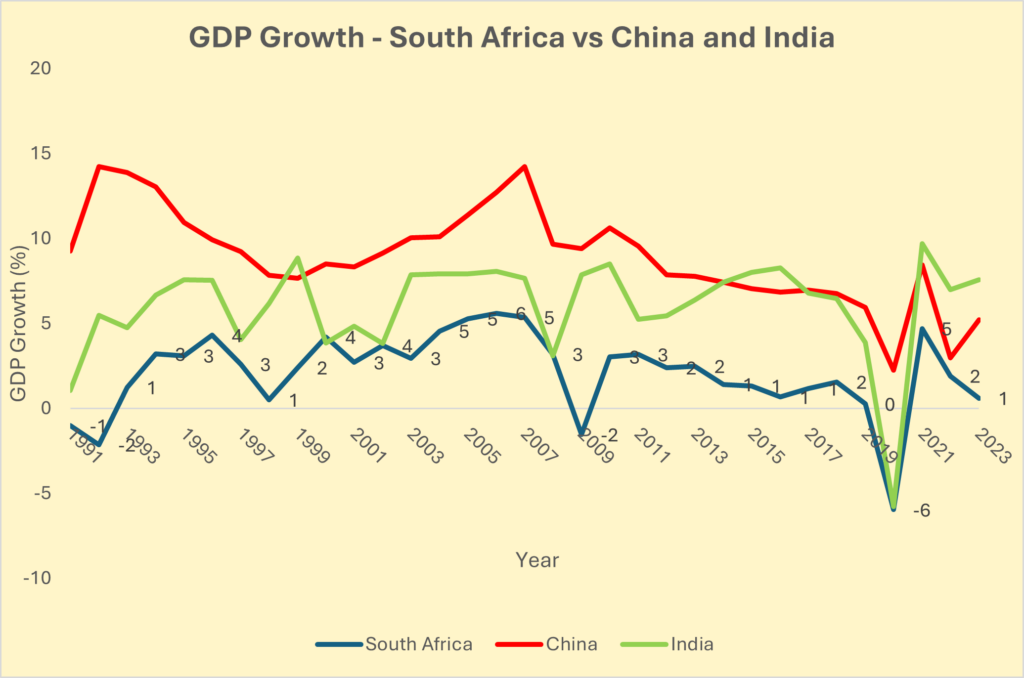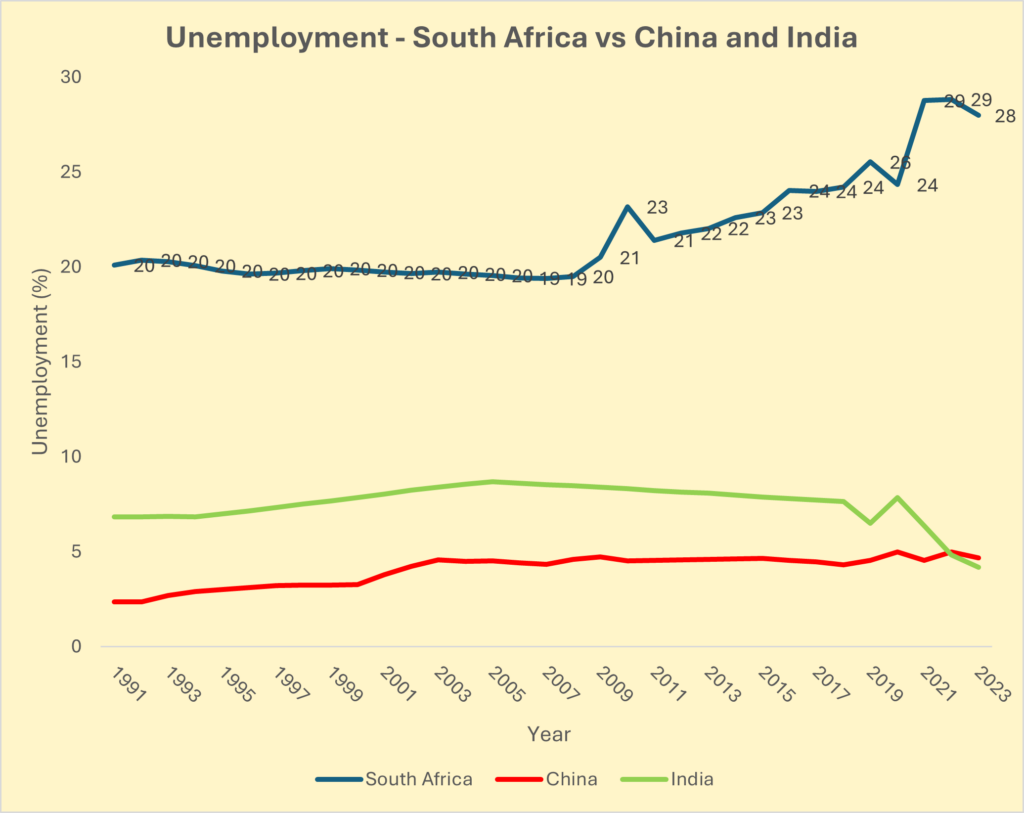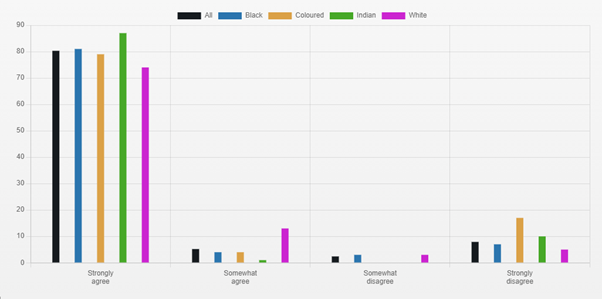*This extended essay is a longer version of an article I previously published in Business Brief in July 2024*
***
The challenges facing South Africa seem crippling.
They may feel like a sailboat facing the headwinds of a lethal South Atlantic storm.
Yet there is a way to sail through the storm fast and reach the port.
Approaching the storm, the sailors mistake berg economic tailwinds for headwinds.
There is an opportunity to address two of South Africa’s major obstacles of unemployment and corruption simultaneously.
The crux of this proposal is that South Africa’s labour market regulation is liberalised in return for a conditional amnesty on wrongdoing in office from 1994. I call this “Operation Tailwinds” – taking up available options to get South Africa moving.
It would involve an agreement between South Africa’s two largest political parties – the African National Congress (ANC) and the centrist Democratic Alliance (DA) – now in a multi-party coalition named the Government of National Unity (GNU). The ANC lost its national majority in the elections of May 2024 for the first time since 1994. The ANC and DA achieved 40.18% and 21.81% respectively.
The ANC would agree to normalise South Africa’s obstructive labour market, including scrapping most BEE legislation. That would swiftly cut unemployment.
BEE refers to the labour market policy of Black Economic Empowerment, requiring companies to comply with everything from black equity allocations to black employee quotas.
In return, the DA (and other GNU partners) would agree not to pursue ANC individuals previously involved in malfeasance, on the condition that they co-operate with authorities.
“Operation Tailwinds” offers both parties much of what they want, with little downside.
Years back, a prominent analyst suggested that if the two parties were to co-govern, this may form part of a deal. That could be formally, or in the form of a gentleman’s agreement, for when the time is right. At the time of writing, I do not know if anything to this effect has been reached.
The same analyst told me recently on the condition of anonymity: “… you may now see less fundamentalism on BEE from the ANC side of the spectrum, and with that, reduced zealousness in pursuing historical state capture suspects for prosecution from elements of the non-ANC side of the spectrum.”
State Capture refers to widespread corruption that proliferated in the 2010s.
Many mutually beneficial bargains have been struck throughout history.
In 1948, through The Marshall Plan, the US provided economic aid to rebuild Europe after WWII. In return, Europe opened its markets to American goods.
In Northern Ireland, my homeland, decades of conflict were ended by the Good Friday Agreement (GFA) in 1998. Northern Ireland’s status was recognised within the UK. In return, Northern Ireland citizens could claim citizenship of Ireland, the UK or both.
The beauty of the GFA was that its deep, all-encompassing nature allowed something for everyone to be woven in.
In the 1980s, the ANC agreed not to pursue mass nationalisation. In return, business would endorse affirmative action.
With a straight line of history running from 1994 to the pact of June 2024, I will elucidate my proposal of Operation Tailwinds.
***
South Africa’s labour market – Not going to work
A first is that South Africa’s labour market is a tragedy. Many still pursue policies that have brought about misery for millions. As Einstein said, insanity is doing the same thing over again and expecting different results, and it seems this would apply to South African policymakers.
That is why South Africa hits global top spot for unemployment, at 33%, according to Statistics South Africa (SSA). (Or maybe that is just me.) In 2023, that outstripped unemployment in Gaza and Djibouti. That figure ignores those who have given up seeking work.

Source: Data provided by the World Bank (2024) and prepared by Our World in Data.
The vibrancy of the informal sector tempers that figure slightly. Such are the barriers to entry into the formal sector that in 2022, SSA estimated that around 2-3m people were employed informally. That was around 5-7% of the working age population in 2022, at 39.2m.
Author Richard Dowden’s 2008 book “Africa: Altered States, Ordinary Miracles” asserts that “The future of South Africa has always been a race between economic growth and the expectations of the post-apartheid generation… To deliver fully … the economy has to grow at around 7-8% [annually] …”
Post-apartheid South Africa – which should be a ‘young-and-bustling-emerging market’ – has never reached those numbers.


GDP Growth and Unemployment South Africa vs high growth emerging markets. Source: World Bank. Last Update June 2024. Statistics South Africa’s metrics for unemployment may differ to those of the World Bank.
Among the policies hostile to job creation is Broad-Based Black Economic Empowerment (BBEEE or BEE).
Its requirements have been ratcheted up since inception in 2003.
Countries like Malaysia have pursued quotas, but those tend to focus on the public sector. Nowhere in the world approaches the social engineering applied to the private sector in SA.
High minimum wages ensure the underworld grows. What should be set at half the mean salary is in SA above the mean salary.
Central to ANC-psychology is that these policies should be pursued gradually. Otherwise, they would be noticed and opposed.
The ANC has recently even doubled down on such ‘transformation’. In July 2024, it enacted the ‘Public Procurement Act’, meaning that:
‘… all government bodies will have to follow the same rules on setting aside contracts for black empowerment …’ That is according to writer Jonathan Katzenellenbogen.
One might ask, then, how could the party backtrack on this path?
Yet author RW Johnson likens the current period to the late 1980s in South Africa. The Apartheid government had introduced a litany of race-based legislation that was built up over half a century.
“… it appeared likely … that it would take just as long to dismantle it. But in practice, that didn’t happen … it was … when De Klerk made his big turn in February 1990 … And very quickly, it was all gone. Now, … that the same situation is building up with the ANC…”
Labour market normalisation is South Africa’s short walk to economic freedom.
***
Corruption – Skeletons in the cabin
A second major problem is deep-rooted corruption.
Many ANC members have engaged in acts of corruption during the party’s time in office.
Politicians’ collusion with construction mafias collapses development. The hospital does not get built.
The new team of sailors in the GNU have started to uncover some of these skeletons below the deck.
These include Dean Macpherson – the Minister of Public Works and Infrastructure – who unearthed that around ZAR 300m (USD 16m) had been stolen through cyber-crime in the last 10 years.
A current case involves the current Minister of Justice, over a controversial loan from VBS Mutual Bank.
There is likely much more to come as cleanouts reach other departments.
A long-held fear of ANC members involved in corruption is time behind bars.
This raises the question, “Can the ANC concede power?”
For the most part, it has done so. In that sense, 2024 is as historically significant as 1994. The dominant party’s loss of power is African democracy’s biggest test of them all.
However, it may well be the case that some politicians are not conceding power in certain provincial legislatures and local governments, to hide the skeletons. (The latter refers to councils/municipalities).
Former SA Chief Justice Zondo published a report in 2022 which named or implicated around 200 officials who allegedly perpetrated ‘State Capture’.
Although welcome, it did not investigate corruption in provincial nor local governments, except for a few tenders in the Free State and the City of Johannesburg Municipality.
***
Raise the sail in 2026: Enter “Operation Tailwinds”
These dual storms of corruption and unemployment may reach a tipping point at the same time. The key is in the timing to introduce the operation. I will leave that to others – sometimes the pace of change can be too fast and disruptive. That may topple the boat.
But the year is 2026, and SA is experiencing serious trouble.
The ANC has seen significant losses in the Local Government Elections. Newcomers have exposed substantial corruption at the heart of government.
These exposés are starting to cripple the ANC.
At the same time, the despondency of ordinary South Africans is spilling over into violent protests.
That is understandable for 35-year-old Tintswalo, who has never had formal work and lives on her auntie’s sofa. Life is passing her by. To scrape a living at a carwash, she walks through Johannesburg’s stunning suburbs which feel like another planet. The riots kicking off seem like a good vent. They are making those of July 2021 look like teenagers throwing eggs at the police on a Friday evening.
Now may be the time – the eye of the storm.
The DA does not currently have portfolios covering legal matters (Justice and Constitutional Development or Correctional Services). Yet the latter is currently held by the Freedom Front + (FF+). That party, among others in the GNU, also vehemently opposes BEE and should get behind the plan.
Nor does the DA have portfolios that could pull strings on labour market reform (neither Trade, Industry and Competition nor Employment and Labour).
Yet the point is that the DA could broker an arrangement (that it will have been working on in the background with its allies).
Amid the riots, DA leader John Steenhuisen, should say:
“South Africans are telling us that they want change.
The GNU will be judged on how many jobs it provides.
We propose Operation Tailwinds to get the economy moving again…”
One wonders if an explicit labour regulation bonfire like that of 1990 will self-repeat 30 years on. That would be welcome, but realities may dictate it needs to happen in camouflage.
“Section 1.1. will create a fund for black entrepreneurs – the Black Opportunities Fund (BOF). This will start at ZAR 1000 / week for small businesses such as shop owners.”
This is an idea of party Action South Africa (ASA).
“This should grow to become the emerging world’s most sophisticated startup incubator. SA’s tool to get rich in the 21st century will harness our country’s industrious spirit.
The fund will soon have five spending tiers for applicant projects.
It will be financed through a mixture of loans, grants and equity injections.
A live scoreboard will be updated every three months for the public to view the biggest contributing individuals and businesses to the fund.”
Labour market reform should be sold for what it is – ‘normalisation’ rather than ‘liberalisation’.
“Having consulted the largest employers in the country, we will normalise labour laws to bring South Africa in line with most other African countries.
Section 1.2. will lower the minimum wage to half the national average, enabling businesses to employ more people formally.
Businesses previously operating in the informal sector can come forward and formally register under Section 1.3. for two-year tax exemptions and an amnesty on operating unofficially.
Section 1.4. allows businesses to redirect their funds for Social and Corporate Responsibility (SCR) to the Black Opportunities Fund.”
Then, South Africa’s breakthrough fine print should be deep in the document.
“Section 1.10. allows businesses under a certain size exemption from BEE regulations.”
There are fewer more sensitive things to talk of than BEE. A part of me even sympathises with forced diversity. Keeping small amounts of it for the largest of corporations would not cripple their operations and may provide a hand onto the boat for some otherwise lost at sea. It would also allow the ANC to say that it has not scrapped it completely.
BEE’s critics will always point to the pile of evidence revealing that by its very nature, it advantages the already well-connected.
It is important to sell the operation as ‘Rebooting South Africa’. On that basis, it should include welcome, growth-boosting distractions. The well-meaning red herrings swimming alongside the boat are many. They know the way of the seas.
“Section 2.1. creates a Ministry for the Diaspora, emulating successful engagement programs in countries such as the Philippines.
We are connecting with the 1m first generation South Africans living abroad, or those of South African descent, who wish to support Operation Tailwinds through donations or National Development more generally …
If you wish to return to South Africa, or contribute through investments, a business, or an NGO, you can submit your contribution on the Ministry for the Diaspora website portal.
Selected new projects will qualify for administrative guidance and tax exemptions for up to two years…
We have a task force of 20 individuals to manage these.”
Section 3 facilities South Africa’s second transition.
“Section 3.4 calls for any acts of corruption committed between 1994 and October 2026 to be reported…”
It should not be sold as a “post-ANC-corruption amnesty”.
“…This includes private sector actors, or politicians from any political party at municipal, provincial or national level of government.
Those who come forward will be protected by special police units. They will also receive financial rewards if the information is later verified.
The more the accused cooperate, the more leniency will be applied to their sentences.
In some cases, the convicted may avoid jail time entirely if all wrongdoing is disclosed.”
Carrying the aura of national cohesion,
“We the DA and our allies, we will not hound individuals who are now working with the authorities.
At this critical juncture for our country, we need to come together.”
Although escaping the cell, the wives of the convicted will be embarrassed at suburban book club for all eternity.
This would not be a blanket amnesty of automatic immunity. So long as corrupt officials are divulging information, that they are avoiding imprisonment is not a concession for the DA and its allies. But it should pretend that it is.
In return, the ANC agrees to the establish an elite crime fighting unit, preventing such widespread corruption recurring.
“Section 3.10 will establish ‘The Anti-Corruption Commission’, independent of the National Prosecuting Authority (NPA).
It could only be disbanded by a two-thirds majority in parliament to secure tenure and would be accountable to parliament and not to ministers.”
President Ramaphosa would keep his side of the bargain in his last act as President:
“The 2027 Cabinet reshuffle sees the DA given the following ministries:
- Ministry for the South African Diaspora
- Ministry for Justice and Constitutional Development
The FF+ will be given the Ministry for Trade Industry and Competition.”
***
Dynamics – counter arguments
Earlier this year, I spoke to Wayne Duvenage, CEO of transparency group OUTA – the Organisation Undoing Tax Abuse – on an amnesty.
He later told me the ANC may oppose it, fearing its implosion. That could reduce the ANC to a 20% party by 2029 and collapse it by 2034. This could discredit all coalition members and hollow out the numbers needed for a centre-left/centre-right majority.
Perhaps Mr Ramaphosa is up to a masterstroke in the orderly management of decline, having lived through the death of the once-unassailable National Party.
Putting off firing accused ministers may avoid an explosion on the boat’s deck, and have the ANC finally settle at a centre-left party of around 30%.
These are rational criticisms of my proposal. The scale of the pending scandal may truly startle. I will be accused of overlooking the entrenched nature of South Africa’s problems. That is fine.
My replies to these critiques are numerous.
Revelations may weaken the far-left opposition more than the coalition parties, especially the squeaky clean.
On rocking the boat of the current coalition, revelations could facilitate more careful choosing of sensible ANC parliamentarians in future. There may no longer be an all-consuming need to maintain ANC party unity beyond the next election cycle. One senses Mr Ramaphosa may be tired of the ANC’s disparate, unwieldy, multi-personality disorder. An ANC at 20-25% may still survive and the ex-opposition’s growth could take the GNU firmly into term two.
An ANC seen to be finally grappling with corruption is a renewed one. A sunk ANC could be the catalyst for smaller party consolidation.
Lastly, these scandals should be overshadowed by Operation Tailwinds’ new golden age of job growth – the other distracting side of the bargain.
Catharsis
Duvenage elaborated on an amnesty.
“This could take the form of ‘truth and reconciliation’ style hearings … The international community could certainly be involved in funding it. It would be seen as aid to a developing country … it would have to be mapped out and oversight … conducted by trusted international, independent entities.”
There is no shortage of goodwill and international eyes on South Africa that could assist with resources and personnel. There is also a range of corruption-busting NGOs in South Africa with extensive experience in these matters.
The benefits of a conditional amnesty are many.
A first is that it would save an inordinate amount of time and resources of already overburdened authorities fighting backlogs.
A second is that given so many cases will be pursued regardless, it would encourage information to flow that would not have done so otherwise.
This would be an enormous pressure valve. Skeletons may be going after skeletons if X comrade knows how Y comrade stole funds from Z municipality 10 years ago.
On 11 July 2024, an investigator named Zenzele Benedict Sithole was gunned down in Johannesburg CBD. He was examining cases of fraud, corruption and maladministration.
This kind of calamity could be avoided in future.
Hitmen may not be sent out that night if the perpetrator can now avoid prison by confessing and stepping aside. The information is now pouring in from various angles.
Blood may suddenly come out of a stone. There may be a lot more blood in the stone than anyone thought there could be.
A third is that it may soften the hard landing of the ANC’s final break up. Prosecutions are likely to be long, divisive and costly.
Politicians boxed into a corner hiding things may bite, and not concede power in various corners of government.
A fourth benefit is that it can create a spirit of togetherness, rather than demonising a confronted ANC that symbolises freedom to so many.
I spoke to private investigation expert Mike Bolhuis on matters of corruption. He heads Specialised Security Services.
I did not ask Bolhuis if he would back an amnesty (he may not). Though he told me:
“I am quite sure whatever has been done will come to light, but there … could also be further corruption, ‘you keep quiet about this’.”
When he said this, the above-mentioned assassination in Johannesburg came to mind.
Bolhuis continued:
“So, this is something that’s going to be difficult … the only way to make sure that everything comes to light … is for whistleblowers to come forward without any agenda, other than to say, ‘I am in a position to come forward, I couldn’t before, I felt threatened’.”
He emphasised the need for whistleblowers to be completely protected.
“A lot of people are sitting with information and want to divulge it, but they don’t know how, when and where.
… the pressure cooker system is on … we’ll see the real colour of absolutely everything from the past, coming in slowly.”
Author Klaus Kotzé wrote an academic chapter in 2022 entitled “South African Amnesty 2.0: Incomprehensible?”
Kotzé recently told me,
“I do not inherently support the amnesty [idea]… But, given where we are … ‘Would it in the manner of amnesty 1.0 not aid the state and allow for progress?’”
I had the opportunity to access the work.
“… South Africans should start to consider expedient arguments. Prominent South Africans, including the former Public Protector, Professor Thuli Madonsela, have again proposed an amnesty as a social technology that would allow transcendence from a seemingly intractable situation.
‘We need a reset. The only way we can reset and rebuild is … to find a way of recognising all of the wrongs that are already in the system.’”
… where citizens engage in public processes, and where those who act upon desperate urges … are brought into a new consensus.”
***
Tested water
South Africa’s world-renowned Truth and Reconciliation Commission (TRC) in 1996 showed its citizens and the world that it was serious about moving on.
The proposal would be a further form of transitional justice. If 1994 was a political transition, 2024 is both a political and economic transition.
Elsewhere, in May 2024, Reuters reported how prosecutors in Colombia are weighing immunity for [individuals] “… accused of ties to suspicious purchases of water tankers for 46.8 billion pesos ($12 million), … they were willing to testify in exchange for immunity and protection.”
Similarly, Nigeria’s whistle-blower protection scheme has recovered much in the way of stolen public funds.
Views will differ on the efficacy of Brazil’s Lava Jato (Operation Car Wash), yet it was the emerging world’s most thorough investigation into money laundering and bribery. Many businesspeople and politicians were granted lenience in exchange for collaboration. By 2021, this had led to over 200 convictions, recovered around USD3bn in illicit funds and improved corporate governance.
This year’s VBS Bank scandal in South Africa was revealed partly due to an affidavit from a former employee. The authorities approached him using section 105a of the Criminal Procedures Act 51, allowing for reduced sentences if information is provided.
***
Straw in the storm winds
In mid-2023, when most people were predicting grid collapse, anarchy, and a stolen election, I wrote a contrarian, optimistic time travel piece on South Africa. Many saw it as naïve.
Fast-forward one year. The lights are back on. The turnaround of the national power utility was against the odds even of the most bullish – including me. The election was clean. The ANC accepted the result and struck a brilliant bipartisan deal.
It later emerged that Mr Ramaphosa wished to give the Ministry of Trade and Industry (T&I), responsible in large part for the implementation of BEE, to the DA. Was BEE on the cusp of being diluted? I wonder if that was a straw in the storm winds.
***
BEE’s endgame. Our choice.
A recent poll commissioned by the Social Research Foundation (SRF), a think tank, found that 80.3% of registered voters,
“believe that the country’s labour laws impede job creation. This finding holds with majorities across all the demographic splits…”

Source: Social Research Foundation (SRF)
Votes are only to be won, then, in scrapping BEE and other voluntary handicaps. The public supports that.
Meanwhile, other middle-income countries are steaming ahead. India’s prime minister wants his country to reach the rich world by 2047 through incentivising local industry and a diversified services base. Oil-rich gulf states Qatar and Saudi Arabia are building education cities and AI hubs in the desert.
Back in South Africa, dogged ANC circles are unrelenting in their waning ideological crusade, even if that means turning the country into a wasteland. South Africa’s future lies in ejecting or sidestepping these people spitting in the storm winds.
At 33% unemployment, BEE has been tried and run its course. Like communism (and Apartheid) at the end of the 1980s, it is clear for all to see that its time is up.
Pursuits like BEE lost the ANC the election. And the patience of the masses is not endless. There are well known lasting mental impacts of being out of work for extended periods – ruts, depression, anger, resentment.
Without change, the fuse may well reach the end of the long cord of South Africa’s timebomb.
One would entirely comprehend a surge in violent protests. A cloud on the horizon comes from Bangladesh, when in August 2024 protestors toppled a tyrant. The spark was the enforcement of job quotas for its independence war veterans.
But the easy part of all of this for South Africa is that these policies can be repealed.
These impairments are not cultural nor structural in ways that would require constitutional change, or a mindset shift. In the UK for example, the structural-cultural fixation with drivers of low-quality growth such as housing require profound changes to the national economic-psyche.
Those are hidden crosswinds that you only notice when you cannot seem to reach the shore.
***
Forward – The winds of change in our sails
This begs the question, has modern South Africa ever had an extended period of non-race-based policies?
Any formal employer in South Africa survives and grows despite the edifice of legislation, not because of it. When relaxed, the country will witness an unprecedented rush of job growth. Crime rates will plummet, tax receipts will rocket.
One can only envision the inventions and enterprise to come from BEE’s replacement – the Black Opportunities Fund. That catches the tailwinds of South Africa’s youthful demographics, an energetic and ambitious workforce and unrivalled economic diversity. South Africa has the formula to become the world’s most dynamic emerging market.
So many millions await upliftment to the new middle, with the removal of few laws.
For the black population, that extends continued redress.
Revisiting the examples I gave of The Marshall Plan, Northern Ireland, and South Africa, most people involved thought the differences were irreconcilable, deadlocks would never be broken, and the day would never come. Yet they all found a way out of the storm in thrashing out win-win agreements.
All along, ex-adversaries had much more in common with each other than they ever understood.
A lesser-spotted advantage of the GNU is that it offers exactly that – an opportunity to kill longstanding problems through productive horse trading.
The GNU must succeed. Yet for all the inroads it may make in Home Affairs or Sports, there is a ceiling on progress if people cannot go to work. South Africa’s problems risk only mutating.
Operation Tailwinds would represent a cross between the Truth and Reconciliation Commission, and China’s economic miracle of the late 20th century.
Most countries would be delighted to have such dual tailwinds blowing behind their boat. That is the opportunity to begin again with a fusion of national catharsis and economic prospects.
The sailors may soon see these winds for what they are – tailwinds. And the sail has not been raised for so many years.
The views of the writer are not necessarily the views of the Daily Friend or the IRR.
If you like what you have just read, support the Daily Friend
Image: Generated by OpenAI by the author

